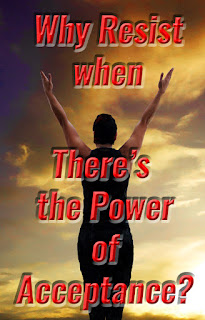 Teachers and parents originally formulate the inner critic in the mind of a young child that is the antithesis of the power of acceptance. It is not that these "authorities" are wrong in their teaching, because we have all be subjected to these teachings that have its origins in the earliest annals of society. In fact, it isn't until we can recognise that "right and wrong" are value judgements of the mind that in many instances have no credence in reality, that we can apply the power of acceptance and move on.
Teachers and parents originally formulate the inner critic in the mind of a young child that is the antithesis of the power of acceptance. It is not that these "authorities" are wrong in their teaching, because we have all be subjected to these teachings that have its origins in the earliest annals of society. In fact, it isn't until we can recognise that "right and wrong" are value judgements of the mind that in many instances have no credence in reality, that we can apply the power of acceptance and move on.Take the example of a young boy who in his early years witnesses a strange ritual of getting rewarded for keeping his bed dry at night. He would be subjected to statements such as "There's a good boy!" and "You'll be having some treats!" And then if on an odd occasion, he has an accident, he is subjected to a scolding. In other words he is rejected and feels that he has to "be good" in order to gain approval.
As the child grows into an adult, the outer critics (parental/teachers/peers etc) becomes his own inner critic - a stream of nagging thoughts (“should-isms”) that in extreme cases of anxiety, goes on and on and on... For example his mind may say, "If I do such and such, something will bad happen.", or.. "Because I did/said such and such, I ought to be ashamed of myself! If I don’t do such and such, I will be accepted (by others)".
Acceptance from others is what we nearly all crave. Rejection, is what we all dread, regardless of how we interpret the two words. But... The resolution?. The power of acceptance.
A Touch of Eastern Philosophy
Every thought, good or bad is part of us. Thoughts move through our awareness, some we will be positive and optimistic, some not, but automatically, they come and go anyway. If we can reach True understanding and recognise that there is no "part", that we are "at-one", we will recognise that when we try to reject an undesirable thought/feeling, we are trying to reject something that has become ourselves. The main function of the subconscious mind is survival and all too often, anxiety is our defense against what it unwanted, and that therefore, is needed to survive and be ''good/successful and do the 'right' thing, according to our conditioned (subconscious).
An Analogy
A good analogy here would be a glass full of water that is cloudy at the bottom and clear at the top, where does the good water end, and the bad begin? If we try and get out the bad, we will throw away the good. If we stir the bad (e.g. mud) at the bottom, it will contaminate the clear water for a while, but will always settle again and always be part of the water, but if we ignore the bad water and pretend that it’s all good, we'll keep stirring it up with our resistance. Our bodies' are ninety per cent water, and our spirits move just like water (fluid) and then there's the truth that there is no separation. Body, mind and spirit are really and need to be in harmony.
The Power of Acceptance with Others and Situations.
To accept a person exactly the way he/she is, will mellow and transform that person. To accept a situations exactly the way it is, will transform the way you experience that situation when with that person.
To reject him/her will embitter and cause may hatred that will be directed to him/herself or others.
Rejection was something that was feared more than death by execution in primitive societies. So perhaps now, it can be understood just how powerful these two actions are. In reality, they are imaginary – coming from the memory… mind… imagination. They are the same.
Acceptance and Rejection: Clarification
Care needs to be taken here not to confuse acceptance with indulgence.
Acceptance means to acknowledge, observe and where appropriate communicate - communication by writing or speaking can aid clarification. But one must feel "safe" in the participation of such a communication with others.
Indulgence means to react to/on the thoughts/impulses. This means to either deny it and punish yourself for thinking such a thing, or give in to the urges and impulses thus hurting self or others.
Acceptance is doing nothing. Just being. Being with the inner situation. Observing it at deeper and deeper levels and gaining more and more insight into the way that you got it constructed. And at some point during the process, you will be able to "de-structure" it and a transformation will take place. It will be replaced by a more positive attitude if you are ready to accept it.
Because, the inner critic is so ingrained in the subconscious mind, acceptance takes practice, and sometimes needs the guidance of a therapist. This is because paradox on top of paradox can occur in the process and cause confusion.
Derek
No comments:
Post a Comment